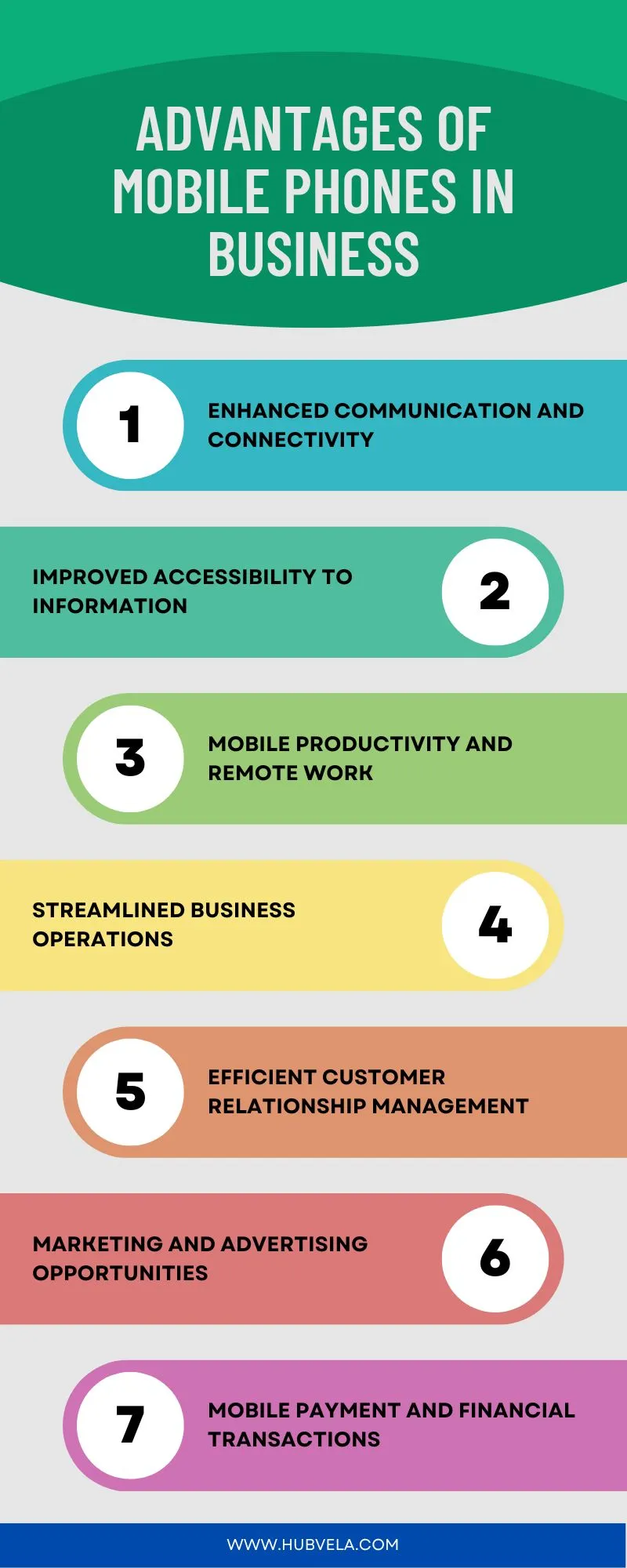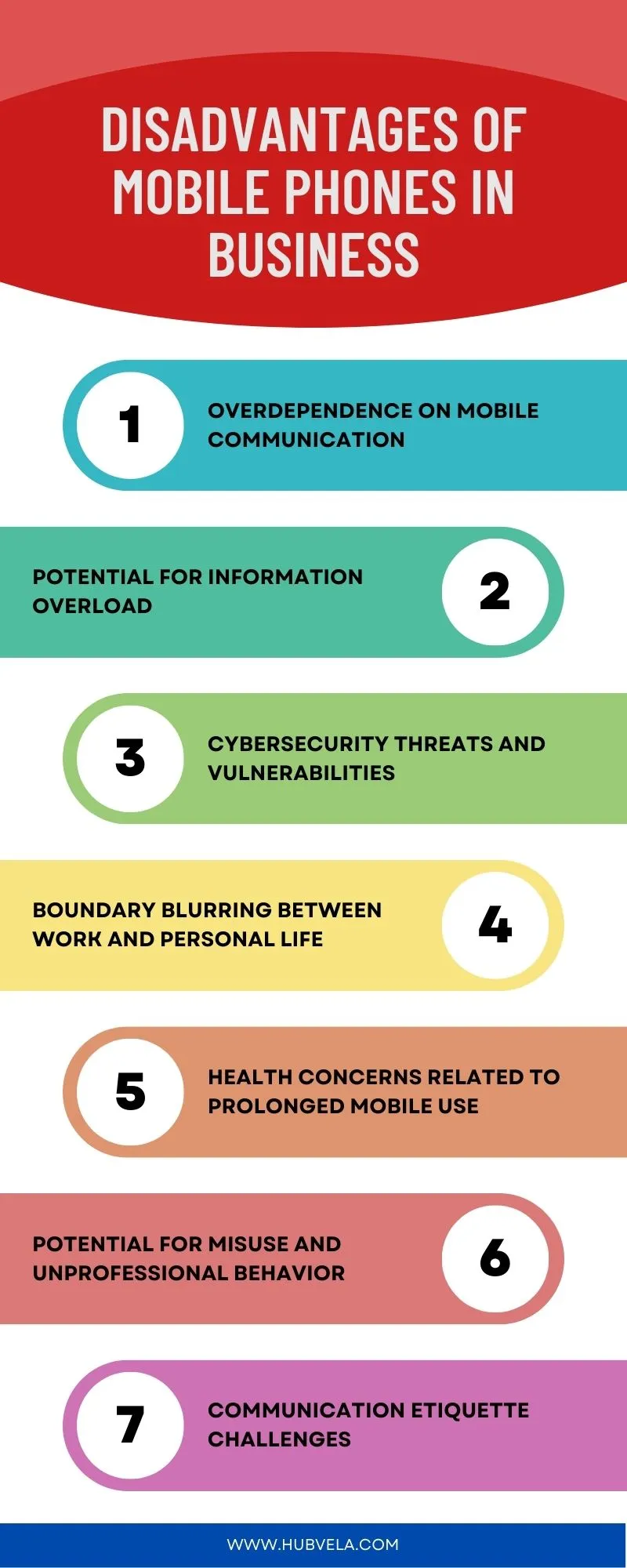Mobile phones have become an essential part of our daily lives, and businesses are no exception. The use of mobile phones in business has both advantages and disadvantages.
On the one hand, mobile phones can enhance communication, increase productivity, and provide greater flexibility for employees.
On the other hand, they can also be a distraction, a security risk, and an additional expense for the company.
In this article, we will explore the advantages and disadvantages of mobile phones in business and help you make an informed decision about whether to incorporate them into your business operations.

--Advertisement--
Advantages of Mobile Phones in Business
Mobile phones have become an essential part of our daily lives, and their use has extended to the business world. The advantages of mobile phones in business are numerous, and they can help boost the productivity, mobility, safety, and morale of the workforce.
We will explore the benefits of using mobile phones in business and how they can help companies stay competitive in today’s fast-paced world.

1. Enhanced Communication and Connectivity
Mobile phones have revolutionized the way businesses communicate and stay connected. With the advent of smartphones, employees can stay connected to their colleagues, clients, and customers from anywhere and at any time.
Mobile phones offer a range of communication options, including voice calls, text messages, emails, and video conferencing.
This enhanced connectivity allows businesses to operate more efficiently and effectively, as employees can quickly respond to queries, resolve issues, and collaborate with team members.
Additionally, mobile phones enable businesses to stay connected with their customers, providing them with timely updates, promotions, and support.
The enhanced communication and connectivity provided by mobile phones have become a critical component of modern business operations.
2. Improved Accessibility to Information
Mobile phones have revolutionized the way businesses operate, and one of the significant advantages of mobile phones in business is improved accessibility to information.
With mobile phones, employees can access information from anywhere, at any time, and stay connected with their colleagues and clients.
Mobile phones allow businesses to stay competitive by enabling employees to respond to customer inquiries promptly, access critical data, and make informed decisions.
Additionally, mobile phones have made it easier for businesses to manage their operations remotely, reducing the need for physical presence in the office.
Improved accessibility to information has made businesses more efficient, productive, and responsive to their customers’ needs.
3. Mobile Productivity and Remote Work
Mobile productivity and remote work have become increasingly important in today’s business world. Mobile devices offer workers greater flexibility, enhance workflows, improve communications, and help to make users more efficient and productive.
With mobile devices, users can work wherever and whenever they need to, while still providing them access to corporate resources. They can take their offices with them, whether traveling, commuting, working in the field, or desk-bound at home.
Mobile devices also enhance workflow by extending business processes and making them more efficient. They simplify processes, eliminating duplicate efforts, so workers can complete tasks more quickly.
Additionally, mobile devices in business provide organizations with a competitive edge, as faster and more collaborative communications enable companies to make faster decisions.
4. Streamlined Business Operations
Mobile phones have become an essential tool for businesses, providing numerous advantages that streamline operations and enhance productivity. Mobile devices allow employees to take their offices with them, whether traveling, commuting, or working in the field.
They offer workers greater flexibility, improve communication, and make users more efficient and productive. Mobile devices also provide organizations with a competitive edge, as faster and more collaborative communications enable companies to make faster decisions.
Mobile technology has streamlined operations so much that it costs nearly 1000 times less to start a new business now than it did in the early 2000s, before the mobile revolution. Mobile devices simplify processes, eliminating duplicate efforts, so workers can complete tasks more quickly.
By streamlining your organization’s daily processes, you can achieve many different things that require less work and free up time, such as increased cost efficiency and decreased paper usage.
5. Efficient Customer Relationship Management
Efficient customer relationship management is a crucial aspect of any successful business. Mobile phones have revolutionized the way businesses interact with their customers.
With the help of mobile phones, businesses can easily manage their customer relationships by staying in touch with them through calls, messages, and emails.
Mobile phones provide businesses with the ability to respond to customer queries and complaints in real time, which helps to build trust and loyalty.
Moreover, mobile phones enable businesses to collect customer data, which can be used to personalize marketing campaigns and improve customer experience.
The advantages of mobile phones in business are numerous, and they have become an essential tool for efficient customer relationship management.
6. Marketing and Advertising Opportunities
Mobile phones have become an essential tool for businesses to reach out to their customers. With the increasing use of mobile phones, marketing and advertising opportunities have also increased.
One of the advantages of mobile phones in business is the ability to send targeted messages to customers. Companies can use SMS marketing to send promotional messages, coupons, and other offers to their customers. Mobile advertising is also an effective way to reach a wider audience.
Companies can use mobile ads to target specific demographics and locations. Mobile phones also allow businesses to create mobile apps that can be used to promote their products and services.
These apps can be used to provide customers with information about the company, its products, and services, as well as to offer discounts and other promotions.
7. Mobile Payment and Financial Transactions
Mobile phones have become an essential tool for businesses, and one of the advantages of mobile phones in business is the ability to make mobile payments and financial transactions.
Mobile payments are a popular way to accept payments for goods or services through a mobile POS or mobile devices like a smartphone or tablet.
With mobile payment technology, small businesses can pay for their purchases digitally through their phone without using cash, checks, or credit cards.
Mobile payments reduce or eliminate the need for consumers to carry payment methods like cash and credit cards, meaning that these payment methods are less likely to be lost or stolen.
Mobile payments are also convenient, fast, and easy to use, making them one of the most convenient ways to pay for goods and services.
Disadvantages of Mobile Phones in Business
Mobile phones have become an essential part of our daily lives, and businesses are no exception. They have revolutionized the way we communicate and conduct business, making it easier to stay connected with customers, suppliers, and colleagues.
However, there are also several disadvantages of mobile phones in business that need to be considered. We will explore the drawbacks of using mobile phones in business and how they can impact productivity, workflow, and communication.

1. Overdependence on Mobile Communication
The over-dependence on mobile communication is one of the major disadvantages of mobile phones in business. While mobile phones have made communication easier and faster, they have also made people overly reliant on them.
This overdependence can lead to a lack of face-to-face communication and a decrease in productivity. Employees may spend more time on their phones, checking emails and messages, rather than focusing on their work.
Additionally, the constant notifications and interruptions from mobile phones can be distracting and disrupt the flow of work.
It is important for businesses to establish guidelines and policies regarding mobile phone use to ensure that they are being used effectively and not hindering productivity.
2. Potential for Information Overload
The potential for information overload is a significant disadvantage of mobile phones in business. With the constant flow of emails, text messages, and notifications, it can be challenging to filter out the essential information from the noise.
This can lead to a decrease in productivity and an increase in stress levels for employees. Additionally, the constant need to check and respond to messages can be a distraction from important tasks and meetings.
To mitigate the risk of information overload, businesses can establish clear communication protocols to encourage employees to prioritize their tasks and limit their phone usage during work hours.
3. Cybersecurity Threats and Vulnerabilities
Mobile devices have become an integral part of many organizations, but they also carry significant security risks. Cybersecurity threats and vulnerabilities associated with mobile devices can jeopardize not only the devices but also the corporate network and all its data.
Mobile devices are vulnerable to security risks, especially if they contain sensitive or critical business data. Users might visit rogue websites or respond to phishing emails, inadvertently downloading malware.
Hackers can gain unauthorized or illegal access to data, modify or delete data, and threaten businesses with extortion.
Mobile devices can be attacked at different levels, including malicious apps, network-level attacks, and exploitation of vulnerabilities within the devices and the mobile OS.
With the large and diverse mobile threat landscape, businesses require enterprise mobile security solutions. Therefore, it is essential to take appropriate measures to prevent cybersecurity threats and vulnerabilities associated with mobile devices in business.
4. Boundary Blurring Between Work and Personal Life
The use of mobile phones in business can lead to boundary-blurring between work and personal life, which can be a disadvantage. Employees may feel obligated to be available for work-related calls outside of their working hours, which can interrupt their personal lives.
This can lead to a compromised work-life balance, which can negatively impact their mental health and productivity. Additionally, the constant use of phones for personal communication can disrupt the workflow of employees, leading to lower productivity.
Employers should establish clear guidelines and boundaries for the use of mobile phones in the workplace to prevent these negative effects.
5. Health Concerns Related to Prolonged Mobile Use
Prolonged mobile phone use can lead to various health concerns, which can affect business productivity. One of the most common health issues related to mobile phone use is eye strain, which can cause headaches, blurred vision, and dry eyes.
Another concern is neck and shoulder pain, which can be caused by holding the phone for extended periods. Additionally, prolonged mobile phone use can lead to poor posture, which can cause back pain.
Moreover, the blue light emitted by mobile phones can disrupt sleep patterns, leading to fatigue and decreased productivity. Therefore, it is essential to take breaks and limit mobile phone use to prevent these health concerns from affecting business operations.
6. Potential for Misuse and Unprofessional Behavior
Mobile phones have become an essential tool in the business world, but they also have their disadvantages. One of the potential drawbacks of mobile phones in business is the potential for misuse and unprofessional behavior.
With the ease of access to social media and other non-work-related apps, employees may be tempted to use their phones for personal reasons during work hours. This can lead to a decrease in productivity and a lack of focus on work-related tasks.
Additionally, mobile phones can be a distraction during meetings or important business conversations. It is important for businesses to establish clear guidelines and policies regarding the use of mobile phones in the workplace to prevent any unprofessional behavior or misuse.
7. Communication Etiquette Challenges
Mobile phones have become an integral part of business communication, but they also present some challenges.
One of the communication etiquette challenges is that cell phone communication, both in the form of personal calls and work-related calls, may disrupt an employee’s workflow since it increases the perception that your employees are always available to accept calls.
Employees can become so reliant on their cell phones that they fail to prioritize personal interactions with clients or colleagues directly in front of them or in meetings.
The constant availability of employees through mobile phones can also lead to a lack of work-life balance and burnout.
Therefore, it is important to establish clear guidelines and policies on the use of mobile phones in the workplace to ensure that they are used appropriately and do not negatively impact productivity and communication.
Conclusion on Advantages and Disadvantages of Mobile Phones in Business
In conclusion, mobile phones have revolutionized the way we communicate and conduct business. They have become an essential tool for people all over the world, allowing them to multitask and access information on the go.
Mobile phones have contributed to economic globalization and growth, bridging the technology and infrastructure gap in the developing world.
They have also empowered consumers and expanded access to financial services for underserved populations.
However, the use of mobile phones also presents potential risks to security and privacy, and consumers need to understand and weigh the benefits and risks of this technology.
Overall, mobile phones have both advantages and disadvantages in business, and it is up to individuals and organizations to use them responsibly and effectively.


